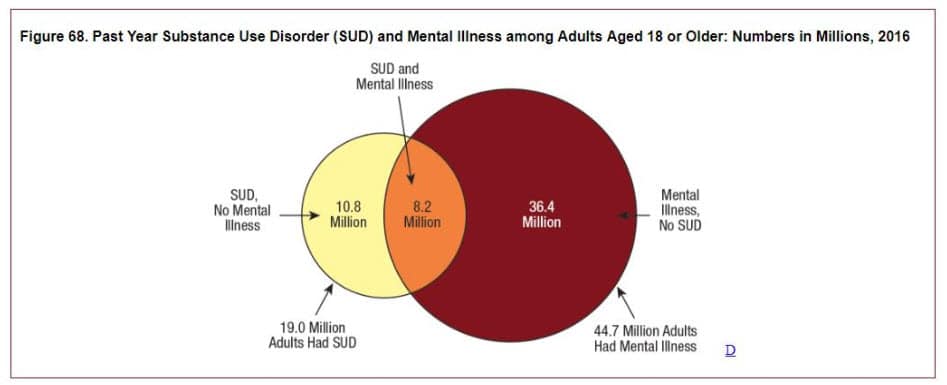Many people diagnosed with a mental disorder start abusing illegal drugs to either fight the symptoms of their illness or deal with the side effects of the medicine used to treat their illness. Scientists have long made the link between mental health disorders and substance abuse. In fact, the co-existence of both is referred to as “co-occurring disorders.”
According to the 2016 National Survey on Drug Use and Health (NSDUH), 8.2 million adults over the age of 18 had co-occurring disorders (see a diagram from the survey below).

Consider schizophrenia. About 50 percent of people suffering from the disorder have also abused illegal substances at some point during their lives, according to the article “Treating Substance Abuse among Patients with Schizophrenia” published in Psychiatry Online.
“It is widely assumed that patients with schizophrenia use substances to reduce psychotic symptoms and alleviate the sedating side effects of neuroleptics. However, the most common reasons given for use of alcohol and other drugs are to “get high” and to reduce negative affective states including social anxiety and tension, dysphoria and depression, and boredom.”
Researchers have made a connection between schizophrenia and marijuana use in particular. Use of the drug causes symptoms of schizophrenia – like hallucinations and paranoia – to get worse.
Teens dealing with a social anxiety disorder are more likely to start using marijuana at an earlier age, according to a study from Case Western Reserve University School.
What are reasons for the connection? There are young users who take the drug to appear more fun and to “alleviate the social anxiety of making friends,” according to the recent “Canadian Youth Perceptions on Cannabis” report, where interviewers spoke to youth participating in the study. In addition to that, both “cannabis intoxication” and withdrawal from the drug can lead to anxiety.
Regular cocaine use is also linked to anxiety disorders and stress.
If you or someone you love suffering from a co-occurring mental health disorder, contact The Council on Recovery.
[From Get Smart About Drugs, a DEA Resource for Parents, Educators, and Care-Givers]
